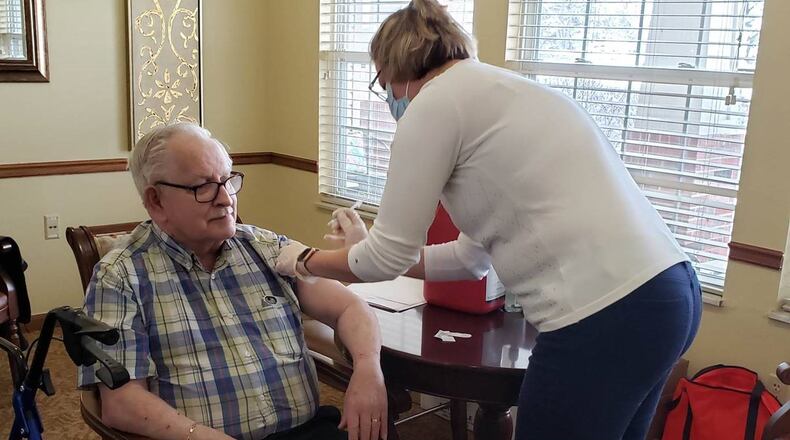With cases (inside and outside of nursing homes) and hospitalizations rising across the state, holiday gatherings on the horizon, immunity from initial vaccines waning and the Omicron variant spreading in the country, experts said booster shots are extremely important.
“The research is showing that those who recently received a booster are demonstrating strong levels of protection against the Omicron variant,” Ohio Department of Health Director Dr. Bruce Vanderhoff said last week. “So in short, if you’re eligible and haven’t gotten your booster, now is the time. Omicron is here.”
AARP Ohio warned last week that the low number of nursing home residents who have gotten boosted is a cause for concern.
“AARP calls on nursing homes, state and federal authorities, and others to increase access to and receipt of COVID-19 boosters for both nursing home staff and residents,” said Holly Holtzen, director of AARP Ohio.
The seniors advocacy group is encouraging people to ask nursing homes when their loved one will be able to receive a shot. According to the latest data from the Centers for Medicare and Medicaid Services, 44 nursing homes in nine counties around Dayton have not given boosters to any of their current residents.
Chip Wilkins, Dayton-based long-term care ombudsman, said the fluidity and constant turnover of nursing home residents poses a challenge to getting vaccination rates higher. He said it’s also possible that immunocompromised residents who received a third vaccine dose as part of their initial series and are waiting to receive another dose six months later might not be counted as residents who are boosted.
Hannah Lefeld, administrator at Piqua Manor, said she believes some vaccinated residents are just hesitant to get the booster. The nursing home offers booster shots at monthly clinics.
“I’ve heard different things: ‘I was sore,’ ‘I didn’t feel good after the second dose,’” she said. “And so I think that causes some reasons for them to be hesitant … We highly encourage patients’ doctors to come in and educate them on the benefits of the booster.”
Wilkins said that his office has received few complaints about residents’ inability to access boosters and to his knowledge, all area nursing homes have made arrangements for booster shots to be administered.
Ursel McElroy, director of the Ohio Department of Aging, said during an AARP Ohio virtual town hall on Monday afternoon that the state agency established the COVID-19 Vaccine Maintenance Program in February to keep vaccines flowing to nursing homes. The program is voluntary, but McElroy said the majority of Ohio facilities have opted into it.
“The program builds upon the existing relationships between those nursing homes and their long-term care pharmacy so they can provide the booster shots in the facility through this arrangement,” she said. “Any resident or staff member who is interested in receiving the booster should be able to receive it without any delay. In fact, if you have concern that your loved one perhaps has not been asked to receive a booster or has not had access to the booster, we want to know about that.”
Of the 1,750 assisted living facilities and nursing homes in Ohio, 1,422 have opted into the state program. Of those opting into the program, 97% have completed at least one booster clinic.
Resources
Regional Long-Term Care Ombudsman offices can help with questions and advocate for nursing home resident and family concerns, including related to getting residents COVID-19 booster shots.
The Dayton-area ombudsman that covers Montgomery, Preble, Greene, Clark, Miami, Darke, Logan, Shelby and Champaign counties can be reached at 937-223-4613 or 1-800-395-8267.
The Cincinnati-area ombudsman that covers Butler, Warren, Clermont, Clinton and Hamilton counties can be reached at 513-345‐4160 or 1-800-488-6070.
The State Ombudsman: 1-800-282-1206
About the Author

